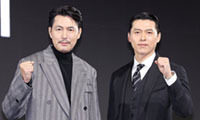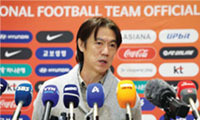▶ Los Angeles Survival
▶ By Ellen Thun
So I visualized them. Then Phyllis and Dan came to Los Angeles in 1929 and I met the picture bride. Only she was no longer the picture bride. Nor was she doll-like. She had taken on the shape of housewife and mother and borne a son, now three years old, called Donald. Dan said they had come to stay, it was not a visit. Dan’s brother, John, brought his family two years before in 1927, and found living conditions precarious in Los Angeles. Minnie told how she worked once in a laundry for 10 cents an hour and was promoted to 15 cents ironing men’s shirts. Had Dan hoped to follow John’s lifestyle which was running vegetable stands? And Jacob (JK) who had made a sudden trip to Korea in 1925 and stayed there for six months, returned to Honolulu and "visited" his parents and siblings until 1927. That year John decided to try his fortune in the mainland and Jacob returned with him. Jacob made an announcement on arriving here that he was married; had married a Korean woman before he left for the Korean trip. It seemed the cousins did sudden and surprising things. Before Dan settled his family into a home, his sisters Rose and Mary came to find work. They did better than their brothers; Rose went into sewing for the garment industry and Mary worked for May Company.
My father suggested I spend time with Phyllis, giving her English lessons. It wasn’t a promising idea. I spoke no Korean and she spoke little English. The lessons started and Phyllis gave up first, with us parting friends. My father said Phyllis was "sick like your mama." Anyway, the English lessons did not help her, and luckily Dan opened a vegetable stand and Phyllis helped him selling. Also, Phyllis met picture brides from an earlier generation here, who took her under their wings and offered a social life. While she was here, Phyllis had another baby who was born with allergies and her hands were full caring for him. Dan, then, decided to return to Honolulu. It wasn’t until 1946 I was to see Phyllis again. She was a different person. She told me after she left Los Angeles, she took the babies to Korea and stayed with her mother for two years. She admitted she had come to Los Angeles because of a "breakdown" and had not been helped by the change.
The two years in Korea had worked and without the use of modern-day drugs. She came back to Honolulu and became active. She and the picture brides from the Korea Maru met to form a club which Phyllis pronounced in Korean “kye” or money association. The group was made up of 10 select picture brides. (I recall only the names of Duk Bong Kim, Phyllis’s closest friend, Naomi Low and Mrs. Tough Chin Ho.) They met at the Diamond Head Road house and slept overnight, so it was also a "pajama party," living dormitory fashion. Each member put in 200 dollars a month, and every month a member, in turn, withdrew 2000 dollars to use in her own way or invest in a plan. With Phyllis it was boardinghouses for low income workers. It was hard work she chose to do, having to do with "elbow grease". I should know; once a week I helped when she stripped 20 beds of sheets, and the rooms of the etceteras and tossed them into the washing machine, laundered and hung them out on the lines to dry. Sometime and somewhere in Korea, she must have decided what she would do when she returned to Honolulu and Dan. Whatever it was, she made up her mind to beat the system in Honolulu that had brought her low. And here she was with 10 friends, making money work, and letting down their hair to each other, and having fun, all at the same time. Doing things in quasi-American style, perhaps, but remaining Korean at heart. They remained themselves — strong-willed Korean ladies!
Phyllis in 1940 gave Dan’s parents a holiday to Los Angeles and have a visit with their children, and to meet the brother, Nak Chung, whom Nak Joon had not seen since 1907. How generous and kind, the old people said, happily off to California, with no "taun" in their pockets. In no time the children they visited sent them on to the next brother or sister. Finally, there were no more children to visit and the parents, alarmed, went to daughter Rose. Rose knew her siblings well, and bought the couple a house to live in. Of the children, Rose was the quietest and most unobtrusive but her eyes took in everything. She told her parents this was their home now, and Jimmy, the youngest son, was asked to live with them, just to keep an eye open for their welfare. The visit, after all, turned out one long holiday for the old people. They were fortunate. Their deaths were sad, however. Nak Joon in 1956 took ill, he was 87 years old, and the hospital sent him home after examination, saying, "Hospitals are to cure people, not for dying in." One day Nak Joon, when his wife was out and Jimmy had gone on an errand, took the bottles of chemicals under the sink and made himself a cocktail and drank it. Jimmy came home too late to stop his father and Nak Joon died on the way to the emergency room. Simoon died in 1966, at 91, after falling and breaking her hip and caught pneumonia during the convalescence. Their deaths are noted here to remind that all good things come to an end.
No sooner had Phyllis sent the parents off, then Dan asked Jacob to come to Honolulu: There were plans afoot for Korean independence public relations work he might fit into. JK brought his daughter, 11-year-old Patricia, with him. The mother had gone off for greener pastures and did not want to be encumbered with a daughter who was no longer a baby or cute. So the two appeared and the less said of their arrival the happier this story will end. Phyllis pondered the pros and cons of the project and decided for the pros. It turned out to be the right move for her and the picture brides to get behind and work for. The Washington United Korean Committee office was conceived and JK selected to the executive chair. World War II was fought and won but Korea was not free or independent. It was carved in half and the American Military Government set up which hired overseas Koreans to "help" in the transition period. JK was one of the workers, and killed in an army transport plane in 1947. There went the family dream about Korea and Jacob. Also Phyllis’ dream which she and the picture brides hoped would bring freedom to their homeland and some recognition of their financial efforts.
But life is an uncertain business. Dan died in 1950 and Phyllis was 45, and having to start her life anew. Dan died bankrupt, the longshoremen’s strike destroyed the local economy, no shipping got to Hawaii, and Dan had just bought into a large service station. Without gasoline to sell, he could not make payments on the lease. He died only weeks before the Korean War broke out. How Phyllis got through the bankruptcy and another start again is the story of the loyalty of the picture brides and a few oldtime Koreans who were staunch friends of Dan’s. In 1953, my brother Jack enroute to Fort Benning, stopped to see Phyllis. He saw her in her new set-up, the start of an apartment house complex that would grow into 20 units, also built for low income persons. It was on King Street near downtown Honolulu, close to the commercial center where workers earned their wages. Arthur, the youngest son, came to Los Angeles to attend City College. It was early 1960. Phyllis followed after a year to make a home for him, he wasn’t happy about City College. Also, Duk Bong Kim with her husband Tay Baek Kim moved permanently here. Their two sons attended USC. Phyllis remained long enough to marry briefly and went back to Honolulu. Once more the picture brides got together, this time to study to become American citizens. Phyllis was naturalized. She told about her examiner who said not to be nervous, taking the test; it concerned herself. His question. What was the 19th Amendment about?" Phyllis was proud of herself, she said, she put 2 and 2 together, and came up with Women’s Suffrage! (Herself=woman). It’s plain, you can’t keep a Korean lady down!
Once Phyllis saw her sons settled, that is married and in their chosen career or work, she relaxed and looked around to do something for herself. It was 1970 and Koreans in the Islands had money to travel and were flying everywhere. Phyllis, again with the picture brides in mind — that is, those who remained in the Islands — suggested to them they join the travelers and see the world. She had contacted charter flight companies and they liked her promoting Koreans to travel to Europe as well as Asia, where they had been going. One of the first trips she found passengers for was Europe that included Moscow. John and Minnie went on this trip. (Of course, Phyllis went free of charge on these excursions.) The most ambitious group she got together, though, were the picture brides visiting Korea and their hometowns. When Mrs. Chung Hee Park, the president’s wife, heard of their plan to visit, she invited them to the Blue House where she greeted them with a reception, and televised them to the nation. Then she sent them off with an escort to ensure their safety and arrival. This was Phyllis’s greatest moment, she said, as it was for the picture brides. When she returned, she became a senior citizen member and used the facilities for extra-curricular activities. Again the picture brides were with her, taking dancing classes and modeling fashion shows. It was all exciting to Phyllis, and in her pictures of this period she looked younger than ever before. She vibrated excitement, I thought. It was during this time she met Mr. Cha, a retired chemist from Chemex, the company that created fiberboards from pineapple plant fibers. These fiberboards were easily, cheaply and quickly made and were shipped over the world to house wartime personnel. Mr. Cha was very proud of his part in the production that helped the war effort. He had come from Korea as a student, attended West Virginia University and took his first position with the Hawaiian company. He married and had a daughter who became a teacher. His wife died sometime before. He lived in Kaimuki, which is a few hundred feet in the hills and has a wonderful ocean breeze flowing through. I mention this location because that was one reason Phyllis began dating him, to spend in his Kaimuki home. From dating, they became partners-in-living. Phyllis said she warned him she would not marry again after her brief marriage in the 1960s. He agreed to the conditions, and they lived together like this until he died in the early 1980s from shingles. Her life was lonely after his death, but she kept lively with trips to Las Vegas and sharing in her children’s marriages and their children. She slowed down and until her death in 1997, at 91 years, she lived in the apartment units she had built. Donald died, and only Basil and Arthur were her "family"; the picture brides had passed on before her. She had a wonderful life. She didn’t come to America for the stereotype dream immigrants were said to arrive with. Hers was simple, to be a picture bride entailing wifehood, motherhood, and economic security for old age. These she accomplished, one of the last Korean picture brides.
스마터리빙
more [ 건강]
[ 건강]이제 혈관 건강도 챙기자!
[현대해운]우리 눈에 보이지 않기 때문에 혈관 건강을 챙기는 것은 결코 쉽지 않은데요. 여러분은 혈관 건강을 유지하기 위해 어떤 노력을 하시나요?
 [ 건강]
[ 건강]내 몸이 건강해지는 과일궁합
 [ 라이프]
[ 라이프]벌레야 물럿거라! 천연 해충제 만들기
 [ 건강]
[ 건강]혈압 낮추는데 좋은 식품
[현대해운]혈관 건강은 주로 노화가 진행되면서 지켜야 할 문제라고 인식되어 왔습니다. 최근 생활 패턴과 식생활의 변화로 혈관의 노화 진행이 빨라지고
사람·사람들
more많이 본 기사
- 트럼프와 여성들 함께 찍힌 ‘엡스타인 사진’ 공개
- 비극 속 시민의 용기 총격범 맨손 제압
- 지구촌 또 ‘총기 난사’… 미·호주 잇단 참사
- ‘박성광♥’ 이솔이, 암 투병 중 안타까운 소식 “병원 몇 번 가는 건지..내 탓”
- 인니 수마트라섬 ‘대홍수’
- 시드니 유대인 총기참사 용의자는 50세 아버지·24세 아들
- 호주 총격범 제압 시민 영웅은 43세 과일가게 주인 아흐메드 씨
- 19개주, 전문직 비자 ‘10만불 수수료’ 소송
- 테슬라 11월 미국 판매… 4년만에 최저
- 오늘 추첨 파워볼 잭팟 11억달러로 ‘껑충’
- 워싱턴 한국학교협의회, 제37회 교사의 밤
- 통계로 본 올해 대한항공… ‘캡틴 아메리카’ 가장 많이 보고, 최다 방문지 도쿄
- 팝핀현준, 수업 중 발언 논란에 교수직 사임… “진심으로 사과”
- “성과는 있었지만 아직 끝 아냐”
- 항공기 승객정보 활용 추방 확대
- ‘아연’의 효과… 올바르게 복용하면 감기 기간 줄일 수도
- 총격 상처 피해 진학한 대학서 또 총기난사… “엄청난 타격”
- 뉴욕 백화점서 아기 기저귀 갈던 엄마, 정신질환자에 흉기피습
- [경제 트렌드] 외식비 줄이는 소비자… ‘팁 공포’ 한몫
- 안수화 회장 연임 확정
- “트럼프, 바이든 데자뷔인줄” 취임 1년새 고령 논란·지지율 뚝
- 페어팩스 고교에 폭발물 소동…10월에 이어 두번째
- 중국 ‘여행자제령’ 직격탄 맞은 일본
- 박나래 ‘링거이모’, 진짜 ‘無면허’였다 “박나래 알지만 전혀 기억 안 나”
- 아이비리그 합격 가르는 것은 ‘스펙’ 아닌 ‘습관’
- 정우성 “현빈과 텐션 점점 무르익어”…사생활 변화엔 “말씀 못 드려”
- “스마트폰 달고 사는 당신, 안구건조증 주의하세요!”
- 투고(To Go) 해야 하나?
- 연방법원, 킬마르 석방 “적법한 추방 명령 없어”
- 오늘의 베네수엘라가 내일의 동아시아국가…
- 남가주한인부동산협회, 송년모임 개최
- “걱정했잖아” 윤정수, 비 그친 발리서 ♥원진서와 신혼여행 만끽
- 백악관 연회장 신축 저지 소송 국가역사보존단체, 연방지법에
- 연말 DUI 집중 단속 무관용 강력 처벌
- ‘계엄2수사단’ 노상원 1심서 징역 2년… “계엄 동력 엄중책임”
- [이민법 칼럼] 더 힘들어진 취업이민 1순위
- 미, 베네수엘라 지상전 위협… 쿠바까지 흔들기
- 관세가 끌어올린 물가… 가구당 1,200달러 추가 지출
- 故 김지미에 금관문화훈장…마지막 말은 “보고싶다 사랑한다”
- 트럼프 관세 인하에도… 주요 식품 줄줄이 급등
- 모두가 원하는 물가 하락… 반드시 긍정적이지 않아
- 승부사끼리는 통한다…젠슨 황의 트럼프 공략 비결은
- 제트블루 여객기, 카리브해 상공서 미군 급유기와 충돌 위기
- 중, 난징대학살 추도… ‘일본군 해골 베는 포스터’도
- 퇴조의 핑크 타이드
- 존 이 시의원, 선물 수수 ‘윤리 위반’
- 미 무역적자, 5년여 만에 최저
- “마두로는 마약조직 총책”… 트럼프 속내는 석유 확보?
- 버지니아, 도로 상태‘전국 2위’…MD 13위·1위 GA
- 새 회장에 유흥태·부회장 최인환 목사 선출
1/5지식톡

-
 테슬라 자동차 시트커버 장착
0
테슬라 자동차 시트커버 장착
0테슬라 시트커버, 사놓고 아직 못 씌우셨죠?장착이 생각보다 쉽지 않습니다.20년 경력 전문가에게 맡기세요 — 깔끔하고 딱 맞게 장착해드립니다!장착비용:앞좌석: $40뒷좌석: $60앞·뒷좌석 …
-
 식당용 부탄가스
0
식당용 부탄가스
0식당용 부탄가스 홀세일 합니다 로스앤젤레스 다운타운 픽업 가능 안녕 하세요?강아지 & 고양이 모든 애완동물 / 반려동물 식품 & 모든 애완동물/반려동물 관련 제품들 전문적으로 홀세일/취급하는 회사 입니다 100% …
-
 ACSL 국제 컴퓨터 과학 대회, …
0
ACSL 국제 컴퓨터 과학 대회, …
0웹사이트 : www.eduspot.co.kr 카카오톡 상담하기 : https://pf.kakao.com/_BEQWxb블로그 : https://blog.naver.com/eduspotmain안녕하세요, 에듀스팟입니다…
-
 바디프렌드 안마의자 창고 리퍼브 세…
0
바디프렌드 안마의자 창고 리퍼브 세…
0거의 새제품급 리퍼브 안마의자 대방출 한다고 합니다!8월 23일(토)…24일(일) 단 이틀!특가 판매가Famille: $500 ~ $1,000Falcon: $1,500 ~ $2,500픽업 & 배송직접 픽업 가능LA…
-
 바디프렌드 안마의자 창고 리퍼브 세…
0
바디프렌드 안마의자 창고 리퍼브 세…
0거의 새제품급 리퍼브 안마의자 대방출 한다고 합니다!8월 23일(토)…24일(일) 단 이틀!특가 판매가Famille: $500 ~ $1,000Falcon: $1,500 ~ $2,500픽업 & 배송직접 픽업 가능LA…
케이타운 1번가
오피니언
 옥세철 논설위원
옥세철 논설위원오늘의 베네수엘라가 내일의 동아시아국가…

퇴조의 핑크 타이드
 조지 F·윌 워싱턴포스트 칼럼니스트
조지 F·윌 워싱턴포스트 칼럼니스트 [조지 F. 윌 칼럼] 대통령의 전쟁수행권
 조옥규 수필가
조옥규 수필가 투고(To Go) 해야 하나?
 신경립 / 서울경제
신경립 / 서울경제 [만화경] ‘뒷마당’ 찾겠다는 트럼프식 먼로주의

22기 LA평통 출범에 거는 기대

연말 시즌 사기·범죄 경계해야
 메건 매카들 워싱턴포스트 칼럼니스트
메건 매카들 워싱턴포스트 칼럼니스트 [메건 매카들 칼럼] 장편영화의 마지막 챕터인가
 김미선 서북미문인협회 회장시인
김미선 서북미문인협회 회장시인 [한국춘추] 하늘을 계산한 사람들, 칠정산
1/3지사별 뉴스

“마약밀매·인신매매 등 국제범죄 척결” ‘국토안보 태스크포스’ 뉴욕지부 출범
연방 국토안보부가 10일 ‘국토안보 태스크포스’(HSTF) 뉴욕지부를 출범시켰다.HSTF는 마약 카르텔, 인신매매, 자금세탁, 갱단 등 국제범…
‘오바마케어 보조금’ 올해 말 종료 가능성 ↑ 커져

워싱턴 한국학교협의회, 제37회 교사의 밤
재미한국학교 워싱턴지역협의회(회장 정광미)가 13일 ‘제 37회 교사의 밤’을 개최, 한 해 동안 헌신한 교사들의 노고를 위로했다. 올해 최우…
안수화 회장 연임 확정

총격 상처 피해 진학한 대학서 또 총기난사… “엄청난 타격”
고교 총격 사건 생존자인 미아 트레타가 브라운대 총격 사건 이후 인터뷰하는 모습. [로이터]동부 브라운대에서 총격 사건으로 10여명의 사상자가…
내년 중간선거 낙관못하는 트럼프… “경제성과 전달에 시간 걸려”

오늘 하루 이 창 열지 않음 닫기 





















































.png)


댓글 안에 당신의 성숙함도 담아 주세요.
'오늘의 한마디'는 기사에 대하여 자신의 생각을 말하고 남의 생각을 들으며 서로 다양한 의견을 나누는 공간입니다. 그러나 간혹 불건전한 내용을 올리시는 분들이 계셔서 건전한 인터넷문화 정착을 위해 아래와 같은 운영원칙을 적용합니다.
자체 모니터링을 통해 아래에 해당하는 내용이 포함된 댓글이 발견되면 예고없이 삭제 조치를 하겠습니다.
불건전한 댓글을 올리거나, 이름에 비속어 및 상대방의 불쾌감을 주는 단어를 사용, 유명인 또는 특정 일반인을 사칭하는 경우 이용에 대한 차단 제재를 받을 수 있습니다. 차단될 경우, 일주일간 댓글을 달수 없게 됩니다.
명예훼손, 개인정보 유출, 욕설 등 법률에 위반되는 댓글은 관계 법령에 의거 민형사상 처벌을 받을 수 있으니 이용에 주의를 부탁드립니다.
Close
x